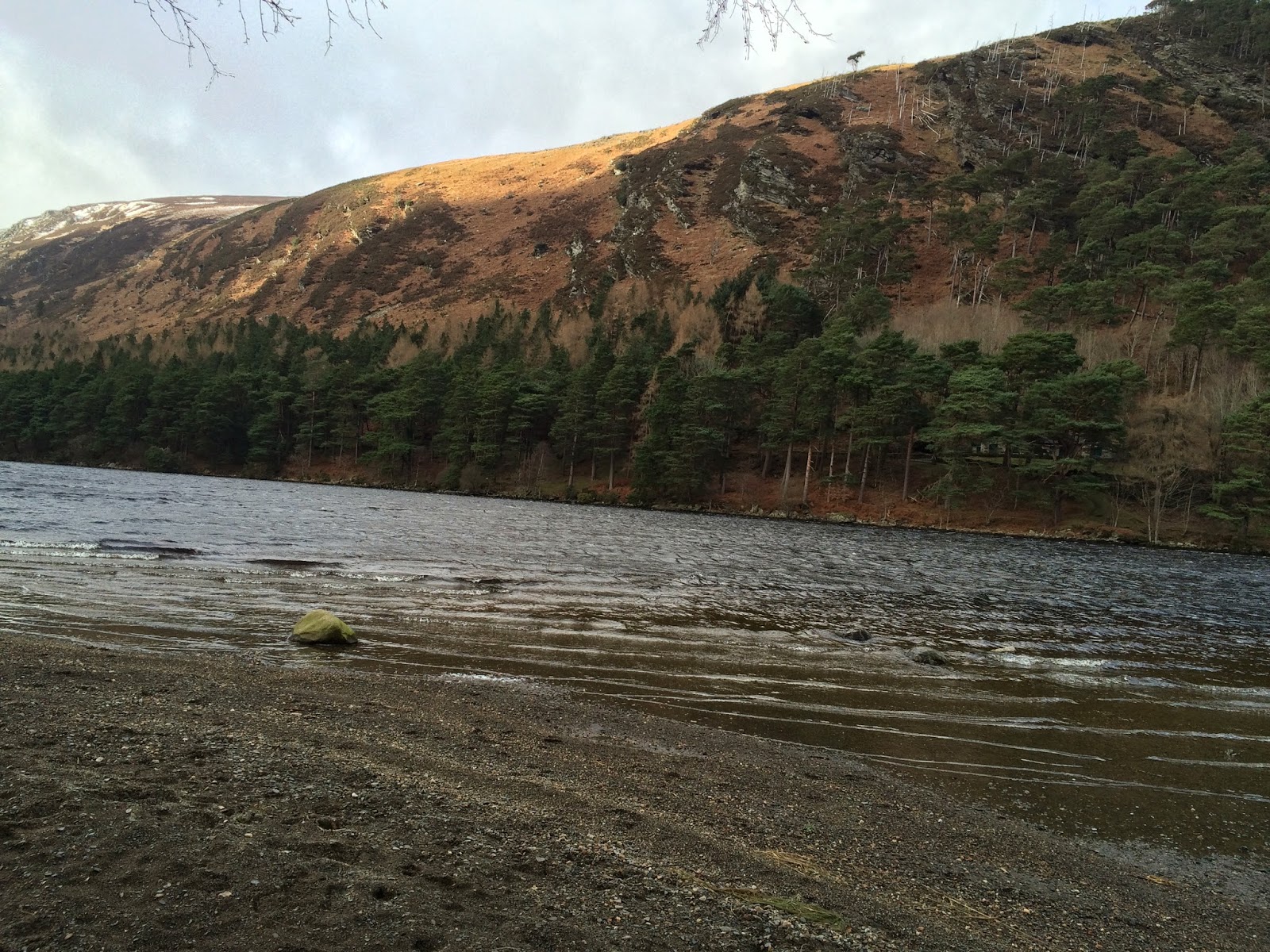I was getting a little cabin-feverish in Dublin (I mean, really, when you go all the way across the Atlantic and then spend two weeks in the same 3-4 mile radius ...) so I decided to head out yesterday morning to Glendalough (pronounced Glendalock, not Glendaloo as I first thought.) I was honestly expecting it to be a fairly busy area, since it was the home of St. Kevin and has an abundance of monastic ruins. Instead, it turned out to be quiet and desolate. I don't think I saw more than 200 people over the two days I was there, which was
weird after the last four weeks or so. I certainly didn't expect to find such high hills (they call the mountains, but after living in the shadow of Mt. Rainier for most of my life, I hesitate with that term) or snow and possibly hail. The scenery was gorgeous, and the hiking trails were absolutely fabulous.
Glendalough means "the glen of two lakes," which were simply called "upper lake" and "lower lake." The visitor's center is below lower lake, and it's about a 20-30 minute walk from lower lake to upper lake. Originally, St. Kevin settled in the desolate place, looking for solitude so he could grow closer to God (called Green Martyrdom.) Eventually, others gathered around St. Kevin to learn from him, and they established a monastic community. Not all the buildings are from St. Kevin's time, but the site of St. Kevin's beehive cell can still be located. For more information about St. Kevin and Glendalough, see the official website
here.
Pictures:
 |
| The view from the visitor's center, right off the bus |
 |
| This was from a bridge, right by the visitor's center |
 |
| Same bridge |
 |
| Just off the bridge |
 |
| The bridge into the monastic ruins |
 |
| The bridge into the ruins |
 |
| Me, in front of one of the church's (St. Kieran's, if I remember correctly?) |
 |
| Same church |
 |
| Same church from the back |
 |
| The cemetery. There were actually some very recent graves; I saw some as late as the 1960's. Then there were a few from the 1914-era, which made me wonder if some of them died in WWI. |
 |
| This was the Cathedral. I don't think it would qualify as a cathedral by the standards of the Italian churches, but most of the Italian churches are a style of architecture called Gothic. As anyone who's studied Medieval history knows, Gothic architecture allowed for much bigger buildings with much more light. This cathedral was Romanesque, a style of architecture that was smaller, heavier, and allowed for fewer windows. This view is from the main entrance looking in. |
 |
| This is from inside. |
 |
| One of the windows. Note that it's very small. |
 |
| This was from the front looking back at the entrance. Notice on the sides, there was an arch at some point. You can still see some of the artistic stonework that formed the arch, but the center has fallen away. |
 |
| This was just simply called the Round Tower |
 |
| There were a lot of these little birds hanging around! This one flew right up to me and posed for me a few times. |
 |
| This is on the boardwalk path going from the lower lake to the upper lake. I think that's dry ground, but I honestly don't know if there's water beneath all those plants |
 |
| My first good view of the upper lake |
 |
| This was the Poulanass (I think I spelled that correctly) Waterfall. The name comes from the Gaelic words that roughly mean "a waterfall in a hole" |
 |
| Can you tell it was a windy day? There was a very strong wind coming from the hills and upper lake |
 |
| This was from the trail that goes to one of the churches and the site of St. Kevin's cell. |
 |
| Same trail |
 |
| It took me a few tries to find this church, even following the trail markers. It's at least a half-hour walk from the main monastic community. |
 |
| And, upper lake. No words - it was just stunning. Unfortunately, the clouds you see blowing in were snow clouds, and they blew in pretty quickly. I was at upper lake when the snow started, which cut my sightseeing short for that day. |



































































